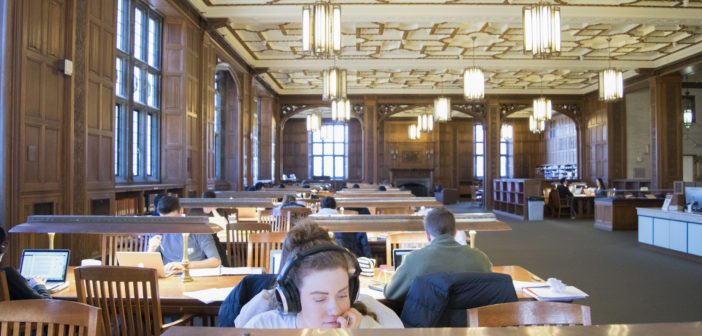In the midst of 4 o’clocks, especially during peak hours, nearly all desks in the libraries are filled.
On the weekends, only Maginnes Hall, Neville Hall, Packard Lab and Rauch Business Center remain unlocked and allow room reservations for students to study. During the week, other academic buildings, such as Drown Hall and STEPS, are open until 10 or 11 p.m., depending on the department.
Linderman Library and Fairchild-Martindale Library are open from 7:45 a.m. to 2 a.m. from Monday to Thursday. On Friday and Saturday, the libraries close at 10 p.m., and on Saturday and Sunday, they open at 9 a.m. This schedule leaves students with less study options during the weeks without 4 o’clocks or finals.
During 4 o’ clocks, however, FML is open for 24 hours all week and certain academic buildings, such as Packard Lab, are open for extended hours until 2 a.m.
Brooke Glassman, ’19, said she often studies in Linderman, but it gets too crowded during 4 o’clocks and finals week, so during those weeks she has to find a place to study at the University Center or other spots on campus. However, she thinks the libraries have been emptier this semester than last semester because of sorority and fraternity new member education.
Edward Shupp, chief of the Lehigh University Police Department, said having all buildings open every day, all day is a big security risk because it allows non-Lehigh students and personnel to access the buildings.
He said there are plenty of spaces for students to study during the year and the additional hours that academic buildings are open for during 4 o’clocks and finals weeks should be enough for students.
The IDEAL Office — made up of the student ID and access control offices — creates the hours of operation for academic buildings.
“The IDEAL Office determines academic building hours based upon a report that the office receives from designated building monitors from each department,” said Will Hlay, who works at the IDEAL Office.
He said building hours cannot be modified by someone without approval from the building monitor, and usually the building hours stay consistent throughout the year. Hlay said it is unlikely building hours will change in the near future.
The IDEAL Office has been working on a new system of electronic access for the past three years, which will replace the old system of swipe access. The office will replace swipes with pads that will allow students to tap their IDs onto it and grant them building access.
With the new system, the IDEAL Office can easily change building hours from the office’s computers instead of manually programming access.
“Universities continue to move forward and continue to make things effective, efficient and safer for everyone involved, and this is one of the ways to do it by card access,” Shupp said.
Hlay said the new security system is a notable upgrade from the old one because they can more accurately monitor who is in certain buildings.
The new security pads will hopefully be installed in all buildings within the next two years and are already installed in residential halls, such as House 104, Upper Cents and Lower Cents.






Comment policy
Comments posted to The Brown and White website are reviewed by a moderator before being approved. Incendiary speech or harassing language, including comments targeted at individuals, may be deemed unacceptable and not published. Spam and other soliciting will also be declined.
The Brown and White also reserves the right to not publish entirely anonymous comments.
1 Comment
Fewer study options, not less.